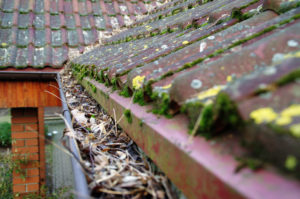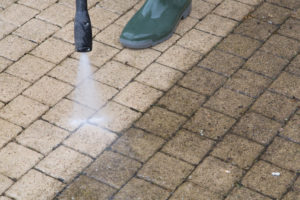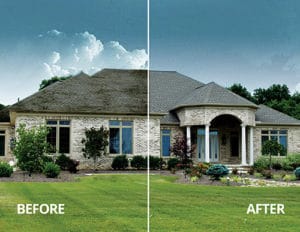Understanding the roof cleaning process
Roof cleaning. This can mean different things to different people. Some may be regularly removing debris from their roof regularly and are proactively pressure washing it. Others may feel their roof is past the point of rescue. Finally, there may be some who haven’t given their roof a second thought recently. The reality is this: there is a lot of misinformation and misconceptions out there about roof cleaning – whether it is why you should clean your roof when you should clean it, the dangers of taking a DIY approach, and the best method for cleaning your roof as not to cause damage (or void the warranty). We’ve put together a list of frequently asked questions about cleaning your roof. When it’s time for your roof to be cleaned, these are the things you need to know.
Why do I need to clean my roof?
Most reasons for cleaning your roof will fall into two categories – enhancing the curb appeal of your home and stopping/preventing damage to the roof from the growth it’s experiencing. As you can imagine, cleaning an old-looking roof can reinvigorate its appearance. That can certainly help to improve your roof’s aesthetics without having a replace a roof that wouldn’t otherwise need it. By electing to clean your roof, you improve the resell value of your home. After all, many times a dark-stained, moss-covered roof is the first thing people see. A roof cleaning can help your home make a much better first impression.
While you certainly want your roof to put its best foot forward aesthetically, it’s even more important that you do what you can to keep your roof from failing sooner than it should. Leaves, twigs, branches, seeds (can you say pollen?), and other debris can cause water to dam up and leak into your home. Elements such as moss and lichen break down your asphalt shingles by fighting against the roof granules, removing them, and causing premature failure. Even if your roof isn’t failing, algae buildup can retain heat, which will cause your air conditioner to work overtime. Cleaning your roof will help save money on your utility bill.
 In addition to protecting your roof, and saving on your utilities, you will also be protecting your homeowner’s insurance. Many insurance companies have started to cancel (and/or refuse new coverage) if there is any growth visible on your roof during an inspection. Cleaning your roof is an essential part of the roof maintenance process.
In addition to protecting your roof, and saving on your utilities, you will also be protecting your homeowner’s insurance. Many insurance companies have started to cancel (and/or refuse new coverage) if there is any growth visible on your roof during an inspection. Cleaning your roof is an essential part of the roof maintenance process.
When should I have my roof cleaned?
On average, it is suggested to have your roof cleaned 18-36 months. However, there are some factors that can determine where in that range your roof might fall:
- Rainfall levels: Roofs that in areas with significant rainfall (Florida summers, anyone?) will encourage mold, lichen, and moss growth on your roof. More growth equals more frequent cleanings.
- Amount of shade: In Florida, we understand the value of shade trees. However, if your roof isn’t seeing much sun, it could increase the growth of mold, lichen, and moss.
- Proximity to foliage: A high volume of leaves, pine needles, branches, and seeds on your roof can mean it needs to be cleaned more frequently.
Can I clean my roof myself?
When it comes time to clean your roof, oftentimes, homeowners feel the best option is to do it themselves. However, there are several reasons why doing it yourself is not recommended. There is the most obvious- the danger to yourself (i.e. climbing ladders, being on a wet, etc.). More so, walking on a potentially weak roof can cause costly damage to both yourself and your roof.
Ultimately, it comes down to the longevity and lifespan of your roof. When an untrained person walks a (shingle) roof, they rub granules from the shingle’s surface. Fewer granules mean less protection. Less protection means reducing the life of your roof.
Can’t I just pressure wash my roof?
 Quite often, when people think of roof cleaning, they think of pressure or power washing. One of the biggest missteps a homeowner can take when it comes to cleaning their roof is the use of a pressure washer. Power washing involves using pressurized water, usually from 1000-3000 psi (pounds per square inch), to remove dirt, growth, and other debris from a surface. However, before you decide to DIY your roof cleaning with your power washer, or hire a contractor who pressures washes your driveway, it’s important to understand the consequences.
Quite often, when people think of roof cleaning, they think of pressure or power washing. One of the biggest missteps a homeowner can take when it comes to cleaning their roof is the use of a pressure washer. Power washing involves using pressurized water, usually from 1000-3000 psi (pounds per square inch), to remove dirt, growth, and other debris from a surface. However, before you decide to DIY your roof cleaning with your power washer, or hire a contractor who pressures washes your driveway, it’s important to understand the consequences.
While power washing is great for areas such as your sidewalk and driveway, power washing your roof comes at a very high price. Pressure washing can damage roofing tiles, flashing, chimneys, and gutters. More so, power washing can break off granules from your shingles. Additionally, there is a risk of damaging the integrity of the installation, leading to leaks inside the home. While you run the risk of shortening the life span of your roof, or damaging the integrity of the installation, having your roof improperly cleaned can potentially jeopardize your roof’s warranty as well.
 What is the best way to clean a roof?
What is the best way to clean a roof?
Using an eco-friendly, soft-clean formula that is gently sprayed on the roof’s surface is the ideal way for your roof to be cleaned in such a way that won’t harm the integrity of your roof. More so, choosing a licensed and insured roofing contractor who is trained to navigate a roof and use proper safety equipment, is the ideal way to protect your roof and your property during the roof cleaning process. A roofer understands the importance of not only cleaning your roof but protecting its longevity
Roof cleaning: what should you remember?
Proper roof cleaning is key to ensuring your roof reaches its full potential. While it may be tempting to do it yourself, it’s important to understand the benefits of choosing to work with a trained roofing contractor who can clean your roof in a safe way that meets manufacturer specifications and won’t void your warranty. More so, a roofing contractor can inspect your roof for potential problems during the cleaning process.
Roof Commander is ready to help you start the process with a free,
no-obligation consultation with one of your highly trained estimators.
Give us a call today at 352-459-7599 or send us a message!